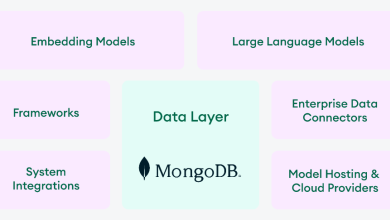
Database and services provider MongoDB held its latest .local customer, partner and developer conference in London at the Hilton Metropole last week, and is looking to win more business through the developer and channel community.
Many specialist software providers, including those like MongoDB, who have free, open source community editions of their products, rely on the developer community to spread good word about their products and services.
That, and their websites, are often the main avenue towards winning new sales around paid for services and scaled up enterprise versions of their products.
The .local event, one of many held around the world, saw the launch of Version 8.0 (see below) of the MongoDB on-premise and Atlas cloud version of the database. IT Europa heard how the company intended to look after developers in pursuit of wider software take-up, as part of the strategy to achieve sustained company growth.
Shane McAllister, global lead for MongoDB developer advocacy, told us: "When it comes to AI and wider automation, the database is the entry point for developers, who are trying to scale-up quickly in response to the C-suite asking them what they're doing in the AI space.
"We are making developers more productive by working with partners like AWS on training, updating apps, and fixing bugs in older products with the help of AI."
McAllister however emphasised that developers were "translators" that had a key role to play in making operations better through their specialist insight.
"While tools in AI, for instance, are useful to help set benchmarks, it is the good developers who can spur functionality and productivity improvements at organisations."
To help the developer community and win hearts and minds, McAllister said his firm was focusing on developing helpful blogs and running regular hackathons and developer days to promote hands on experience.
The company also wants to conduct wider design reviews with customers and their developers, as part of in-person outreach. This activity aims to find out what works best in particular database environments, covering areas like architecture improvements, re-scaling, ease-of-use, cost of ownership, and other areas.
Such outreach promotes the standing of developers, and helps MongoDB improve its products and services, whether they are directly adopted by enterprises, or delivered through cloud service providers - like AWS, Google and Microsoft - system integrators such as Accenture, or managed service providers.
Version 8.0
As for the improvements offered by 8.0, it comes with various data management and throughput improvements. Architectural optimisations have significantly reduced memory usage and query times, and it has more efficient batch processing capabilities than previous versions.
Specifically, 8.0 promises 32% better throughput, 56% faster bulk writes, and 20% faster concurrent writes during data replication.
In addition, 8.0 can handle higher volumes of time series data, and can perform complex aggregations by more than 200%, promises the firm, with lower resource usage and costs.
Horizontal scaling allows applications to scale beyond the limits of traditional database resources, by splitting data across multiple servers, which is known as “sharding”, without having to pre-provision increasing amounts of compute resources for a single server.
Sharding improvements in MongoDB 8.0 distribute data across shards “up to 50 times faster”, we are told, without the need for additional configuration or set-up.


